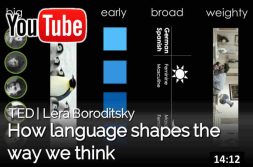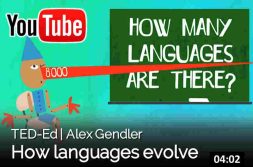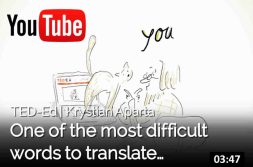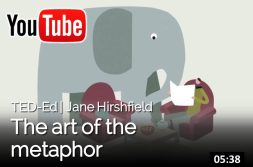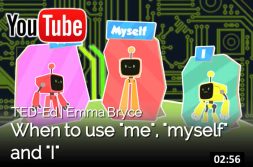Language
Questions
1. What do you think about language?
2. How is your native language different from English?
3. Do you think one day there will be just one language in the world?
4. Does language make personalities different?
5. What languages do you like or dislike the sound of?
6. What are your feelings towards your own language?
7. Do you think body language is universal?
8. What three languages would you really like to speak, and why?
Videos
English is fast becoming the world’s universal language, and instant translation technology is improving every year. So why bother learning a foreign language? Linguist and Columbia professor John McWhorter shares four
[more]
alluring benefits of learning an unfamiliar tongue.
[less]
Category: Education & Language
The development of agriculture was a huge game changer for human beings and it may have even changed the way we speak.
Category: Education & Language | History & Culture
There are about 7,000 languages spoken around the world — and they all have different sounds, vocabularies and structures. But do they shape the way we think? Cognitive scientist Lera Boroditsky shares examples of
[more]
language — from an Aboriginal community in Australia that uses cardinal directions instead of left and right to the multiple words for blue in Russian — that suggest the answer is a resounding yes. “The beauty of linguistic diversity is that it reveals to us just how ingenious and how flexible the human mind is,” Boroditsky says. “Human minds have invented not one cognitive universe, but 7,000.”
[less]
Category: Education & Language
Over the course of human history, thousands of languages have developed from what was once a much smaller number. How did we end up with so many? And how do we keep track of them all? Alex Gendler explains
[more]
how linguists group languages into language families, demonstrating how these linguistic trees give us crucial insights into the past.
Lesson by Alex Gendler, animation by Igor Coric.
Lesson by Alex Gendler, animation by Igor Coric.
[less]
Category: Education & Language | History & Culture
As simple as it seems, it’s often impossible to accurately translate the word you without knowing a lot more about the situation where it’s being said. Krystian Aparta describes the specific reasons why it can be difficult,
[more]
citing examples from many different languages.
Lesson by Krystian Aparta, animation by Avi Ofer.
Lesson by Krystian Aparta, animation by Avi Ofer.
[less]
Category: Education & Language
How do metaphors help us better understand the world? And, what makes a good metaphor? Explore these questions with writers like Langston Hughes and Carl Sandburg, who have mastered the art of bringing a
[more]
scene or emotion to life.
Lesson by Jane Hirshfield, animation by Ben Pearce
Lesson by Jane Hirshfield, animation by Ben Pearce
[less]
Category: Art | Education & Language
Me, myself, and I. You may be tempted to use these words interchangeably, because they all refer to the same thing. But in fact, each one has a specific role in a sentence: ‘I’ is a subject pronoun, ‘me’ is an object pronoun,
[more]
and ‘myself’ is a reflexive or intensive pronoun. Emma Bryce explains what each role reveals about where each word belongs.
Lesson by Emma Bryce, animation by Karrot Animation.
Lesson by Emma Bryce, animation by Karrot Animation.
[less]
Category: Education & Language


